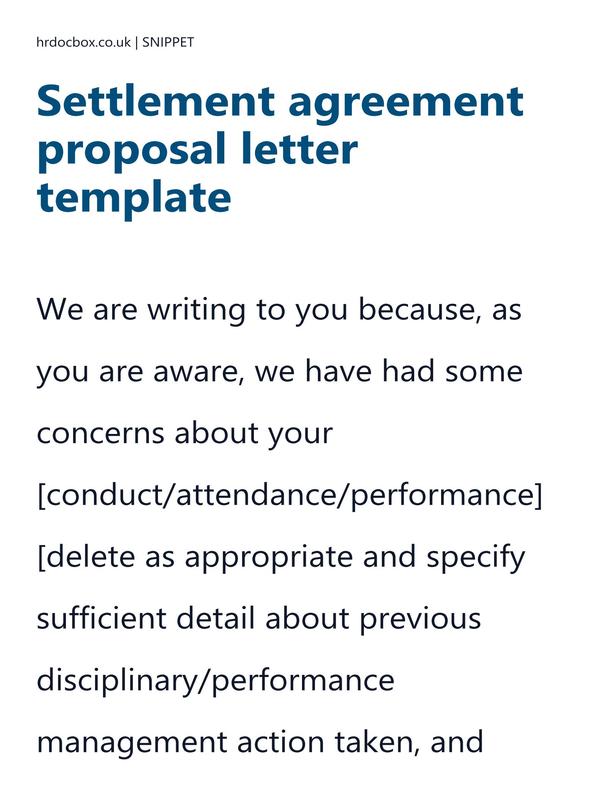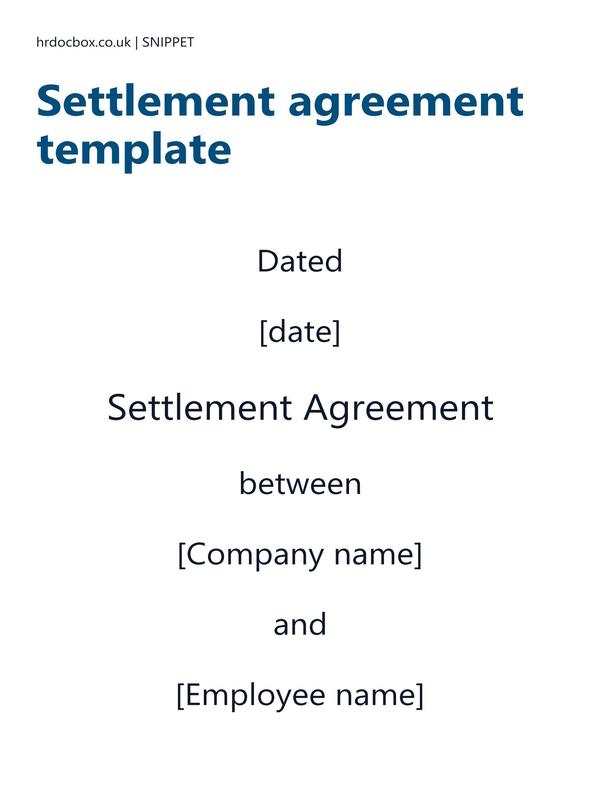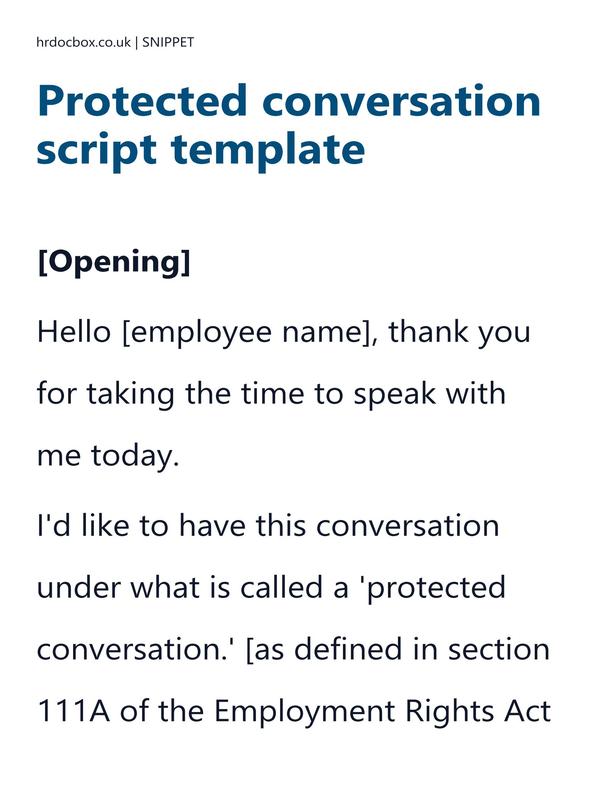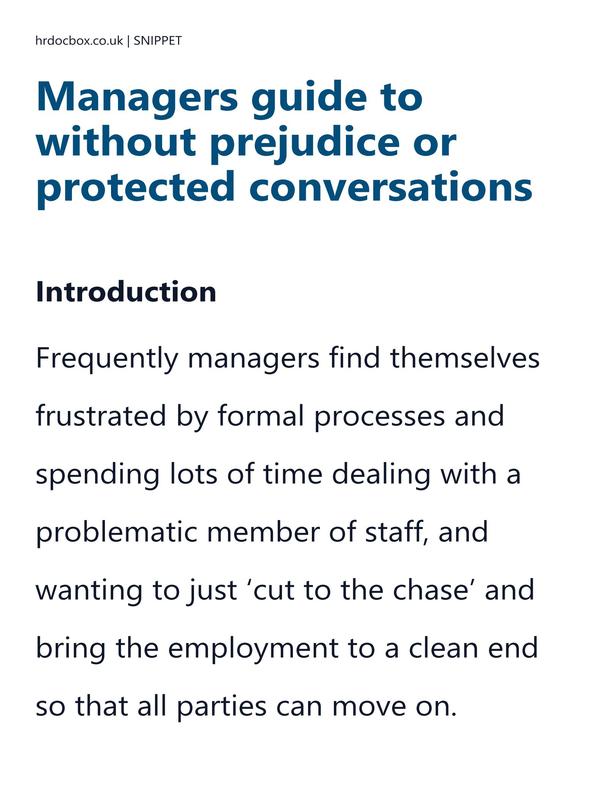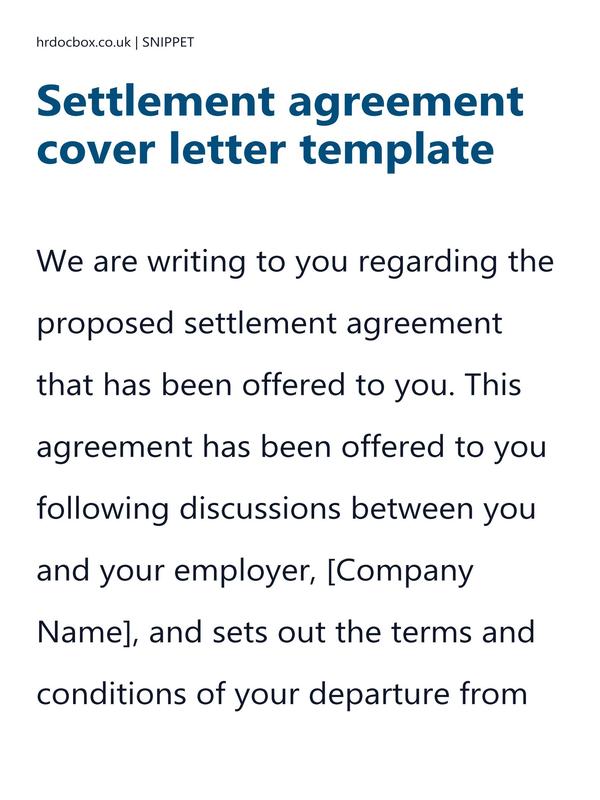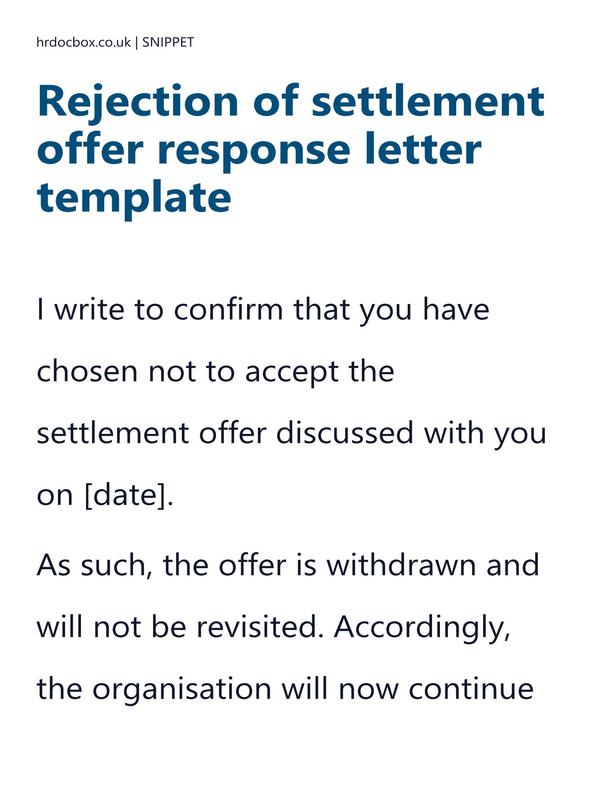Settlement agreement templates toolkit
Our Settlement Agreement Templates Toolkit ensures fair resolutions, simplifying the process of ending employment relationships.
With our Settlement Agreement Templates Toolkit, you'll have access to templates and supporting information that can help you manage the process of ending employment relationships on a mutual basis, protect your organisation's interests, ensure that you meet your legal obligations, and reduce the risk of potential disputes.
- 6 Settlement Agreement templates.
- Includes all Settlement Agreement templates, plus 12 months' access with all updates to the Settlement agreement templates toolkit provided free of charge and notified to you.
- UK-specific accuracy.
- Instantly download templates as Word / PDF / plain text, or send by email.
- The Settlement agreement templates toolkit will SAVE you up to 6 hours drafting & research. Save cost. Reduce risk.
Settlement agreement
A Settlement Agreement is a legally binding contract made between an employee and employee. It is usually entered into at the termination of employment and sets out the full terms between the parties.
Settlement agreements can also be used to resolve an ongoing workplace dispute, for example, a dispute over holiday pay. These agreements can be proposed by either an employer or an employee, although it will normally be the employer.
Once a valid settlement agreement has been signed, the employee will be unable to make an employment tribunal claim about any type of claim which is listed on the agreement.
Where the employer and employee are unable to reach an agreement, the settlement discussions cannot usually be referred to as evidence in any subsequent unfair dismissal claim. Where the settlement discussions are held to resolve an existing dispute between the parties they cannot be used as evidence in any type of claim.
Settlement agreement templates are essential for managing a low-risk, compliant Settlement agreement process.
Compliance
Compliance
-
Settlement agreements can be used to settle a wide range of employment-related disputes, including claims for unfair dismissal, discrimination, breach of contract, and more.
-
For a settlement agreement to be legally binding, it must meet certain requirements, such as being in writing and signed by both parties, and the employee must have received independent legal advice on the terms and effect of the agreement.
-
In exchange for the employee agreeing to settle any potential claims, the employer will typically offer a financial settlement, which may include a sum of money, a reference, and other benefits.
-
Settlement agreements are voluntary, and the employee has the right to reject the proposed terms if they are not satisfactory. However, if the employee rejects the agreement, they may lose the opportunity to receive the financial settlement offered.
-
Settlement agreements can be a useful tool for employers to manage and resolve disputes with employees, as they can help to avoid the time, expense, and uncertainty of litigation.
-
However, settlement agreements are not always appropriate or effective, and employers should carefully consider the specific circumstances of each case before proposing a settlement agreement.
-
Employers must ensure that settlement agreements comply with relevant employment law and do not attempt to waive an employee's statutory rights, such as the right to bring a claim for discrimination.
-
If a settlement agreement is reached, it will typically include a confidentiality clause, which prohibits both parties from discussing the details of the agreement with third parties.
Key Settlement Agreement Case Law
Key Settlement Agreement Case Law
Navigating Settlement agreement processes correctly is crucial to help you avoid any problems (which can be costly in terms of time, money and reputation).
Recent UK case law has highlighted key aspects of good Settlement agreement management. Knowing how courts have handled claims can help you assess whether your proposed actions are likely to be seen as reasonable.
Here are some notable rulings and their implications:
-
Faithorn Farrell Timms LLP v. Bailey (2016):
Facts: The case involved a dispute over the admissibility of a settlement offer made during a protected conversation under Section 111A of the Employment Rights Act 1996. The employee, Ms. Bailey, claimed constructive dismissal and sought to use the content of the protected conversation as evidence.
Outcome: The Employment Appeal Tribunal (EAT) ruled that the content of the protected conversation was inadmissible in unfair dismissal claims unless there was improper behaviour.
Key takeaway: This case reinforced the principle that protected conversations are generally confidential and cannot be used in tribunal proceedings, except where there is evidence of improper behaviour such as harassment or bullying.
-
Basra v. BJSS Ltd (2017):
Facts: Mr. Basra claimed that he had been unfairly dismissed after being asked to resign during a protected conversation. He argued that the conversation itself constituted improper behaviour, making the subsequent settlement agreement invalid.
Outcome: The EAT held that the determination of whether a protected conversation had been conducted properly was a preliminary issue. If the conversation involved improper behaviour, it would not be protected, and its content could be admissible in tribunal proceedings.
Key takeaway: This case highlighted that the protection of such conversations is contingent on the absence of improper conduct.
-
Lenlyn UK Ltd v. Kular (2019):
Facts: The case involved a dispute over a settlement agreement reached during a protected conversation. The employee, Mr. Kular, claimed that he was coerced into signing the agreement and that it should be set aside.
Outcome: The EAT found that for a settlement agreement to be valid, it must be entered into voluntarily and with a full understanding of its terms.
Key takeaway: The tribunal emphasised the importance of ensuring that employees are not pressured or coerced into accepting settlement agreements during protected conversations.
-
Sudhakar v. Paragon Law Ltd (2020):
Facts: Mr. Sudhakar argued that his employer, Paragon Law Ltd, had acted improperly during a protected conversation, making the resulting settlement agreement unenforceable.
Outcome: The EAT reiterated that protected conversations are inadmissible in tribunal proceedings unless there is evidence of improper behaviour.
Key takeaway: The tribunal also stressed the need for clear evidence of such behaviour to invalidate a settlement agreement reached during these discussions.
-
Hirsch v. BMW (UK) Ltd (2021):
Facts: Ms. Hirsch claimed that she had been subjected to undue pressure to sign a settlement agreement during a protected conversation. She argued that the agreement should be void due to the improper conduct of her employer.
Outcome: The EAT found that undue pressure or coercion during a protected conversation constitutes improper behaviour, making the conversation and any resulting agreement inadmissible and unenforceable.
Key takeaway: The case underscored the importance of ensuring that settlement negotiations are conducted fairly and without undue pressure.
-
Graham v. Agilitas IT Solutions Ltd (2022):
Facts: The claimant, Mr. Graham, disputed the validity of a settlement agreement signed during a protected conversation, alleging that he was not given sufficient time to consider the terms and seek independent legal advice.
Outcome: The Employment Tribunal found in favour of Mr. Graham, ruling that the settlement agreement was unenforceable due to the lack of adequate time and opportunity to obtain legal advice.
This case highlighted the necessity for employers to provide sufficient time for employees to consider settlement agreements and to seek independent legal advice.
Instantly unlock with a purchase.
Instantly unlock with a purchase.
Settlement Agreement workflow
Settlement Agreement workflow
Here we show you which resources to use to effectively agree a settlement termination, taking into account the different decisions and directions that are likely / possible.
Following this flowchart will ensure that you factor in all eventualities, follow legal / code of conduct or best practice processes, communicate effectively, and reduce the risk of things going wrong.
Frequently Asked Questions about Settlement Agreement templates
Frequently Asked Questions about Settlement Agreement templates
-
Can small businesses use these Settlement agreement templates?
Yes. The Settlement agreement templates in this toolkit are designed to be flexible and suitable for organisations of all sizes, including small businesses and charities. They follow UK employment law best practice, so even if you don't have an in-house HR team, you can confidently manage Settlement agreement processes and issues.
-
Are these Settlement agreement templates up to date for UK law in 2026?
Absolutely. All templates are drafted with the latest ACAS guidance and UK employment legislation in mind. We review and update them regularly, so you can be confident they remain compliant.
-
What types of Settlement agreement letters and documents are included?
Every toolkit includes a complete set of editable templates, supporting documents, and manager guidance designed to save time and ensure compliance.
-
How will this help me as an HR manager or business owner?
Purchasing the toolkit saves you hours of drafting time and reduces the risk of legal mistakes. Instead of starting from scratch, you'll have clear, professional templates that you can adapt to your business.
-
Do I get instant access to the templates?
Yes. Once purchased, you'll be able to download the Settlement agreement toolkit instantly. The templates are provided in editable Word or Excel format so you can customise them easily, and PDF format for easy sharing.
-
Can I preview a sample Settlement agreement template before buying?
We provide free examples of our templates here. This gives you a sense of the quality and layout before you commit to purchasing the full toolkit.
-
What if I need a full HR toolkit, not just Settlement agreement templates?
If you're looking for broader support, we also offer library bundles that include Settlement agreement templates along with absence, grievance, and other HR policies. These may be more cost-effective if you need a complete HR library.
-
Why should I use these templates, and not AI to generate them?
The risk of using free AI-generated templates 'without review' includes your legal exposure, missing context, and no awareness of the wider process. Purchasing from us mitigates that risk.


